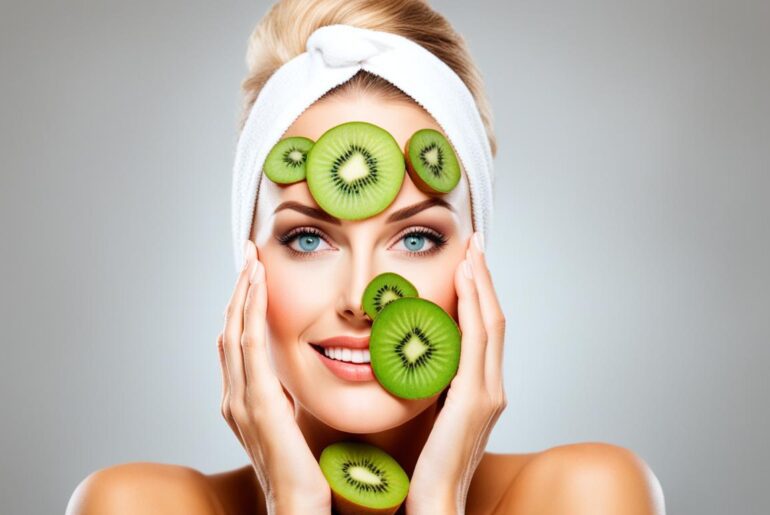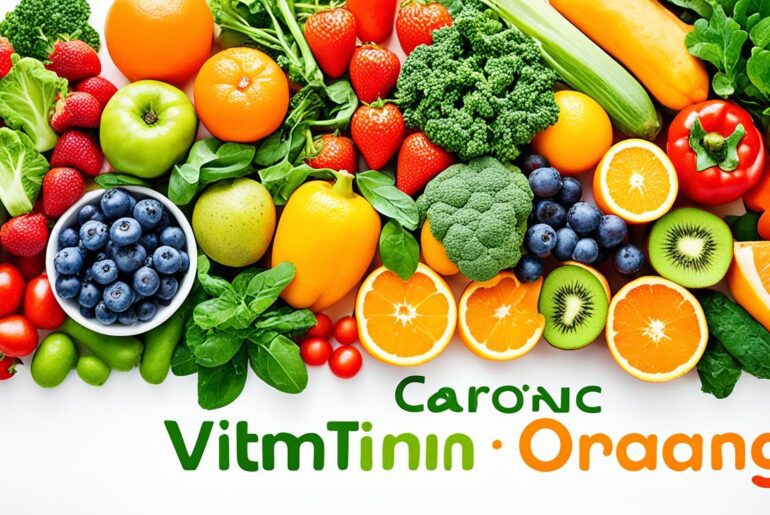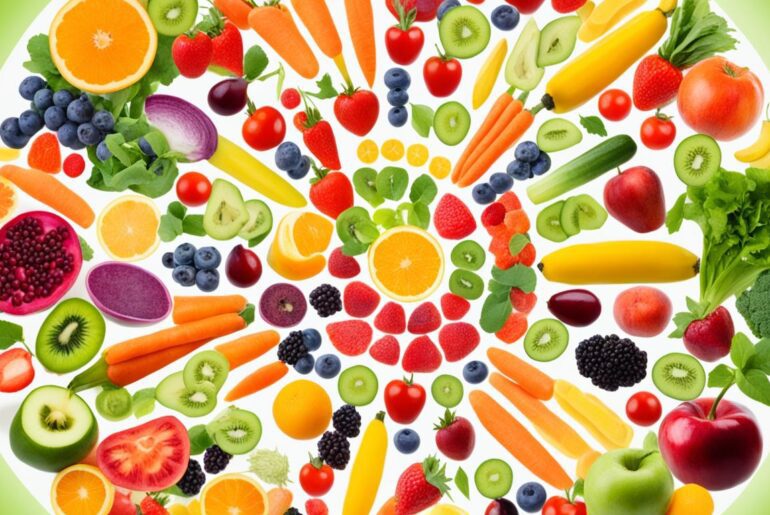Taking care of your skin and maintaining its vitality is a key part of achieving a youthful appearance. One way to support the health and radiance of your skin is by ensuring you’re getting essential vitamins. These vitamins play a crucial role in skin health, including collagen production, skin elasticity, and overall rejuvenation. By incorporating these vitamins into your skincare routine or diet, you can promote youthful and glowing skin.
Key Takeaways:
- Essential vitamins are vital for maintaining youthful and radiant skin.
- Vitamins contribute to collagen production, skin elasticity, and overall skin health.
- Incorporating these vitamins into your skincare routine or diet can promote youthful and glowing skin.
- Consult with a healthcare professional or dermatologist for personalized advice on skincare and vitamin supplementation.
The Role of Oral Vitamins in Skin Health
When it comes to maintaining skin health, oral vitamins are often considered as a supplement to topical creams and ointments. While they can have some benefits for the skin, their impact on reducing fine lines, wrinkles, pores, and dry skin may be minimal. This is because when taken orally, vitamins are distributed throughout the body, not just to the skin.
It’s important to note that exceeding the recommended daily intake of vitamins can have negative effects, particularly with fat-soluble vitamins. On the other hand, water-soluble vitamins are excreted by the body, while excess fat-soluble vitamins can accumulate and lead to adverse effects.
While oral vitamins can contribute to overall skin health, it’s essential to focus on a comprehensive skincare routine that includes topical treatments and a balanced diet. Consulting with a healthcare professional or dermatologist can help provide personalized advice on the best approach to nourishing and protecting your skin.
Vitamins Comparison
| Vitamin | Effect on Fine Lines and Wrinkles | Effect on Pores | Effect on Dry Skin |
|---|---|---|---|
| Vitamin A | Can improve the appearance of wrinkles | No significant impact on pores | Helps moisturize and hydrate the skin |
| Vitamin C | Stimulates collagen production and reduces the appearance of wrinkles | No significant impact on pores | Hydrates and nourishes the skin |
| Vitamin E | Provides antioxidant protection and can minimize the appearance of wrinkles | No significant impact on pores | Helps moisturize and soothe dry skin |
“While oral vitamins may have some benefits for skin health, their impact on improving fine lines, wrinkles, pores, and dry skin may be limited. It’s important to focus on a comprehensive skincare routine that includes topical treatments and a balanced diet.”
When it comes to achieving healthy, glowing skin, it’s important to consider a holistic approach that combines both internal and external care. While oral vitamins can contribute to overall skin health, their effects on specific skin concerns may not be as significant as targeted topical treatments. By understanding the limitations of oral vitamins and incorporating them into a well-rounded skincare routine, you can support your skin’s health and vitality.
The Best Vitamins for Glowing, Youthful Skin

Several key vitamins play a significant role in promoting glowing and youthful skin. Incorporating these vitamins into your skincare routine or diet can support the overall health and radiance of your skin.
Vitamin E: Protecting and Hydrating the Skin
Vitamin E is an antioxidant that protects the skin from sun damage and hydrates it. It helps to moisturize the skin, keeping it soft and supple. This vitamin also assists in reducing the appearance of fine lines and wrinkles, giving your skin a more youthful look.
Vitamin C: Stimulating Collagen Production and Reducing Hyperpigmentation
Vitamin C stimulates collagen production in the skin, enhancing its elasticity and reducing the appearance of fine lines and wrinkles. It also works as an effective antioxidant, protecting the skin from free radicals and environmental stressors. Vitamin C is also known for its ability to reduce hyperpigmentation, giving your skin a more even tone and a radiant glow.
Vitamin A (Retinol): Protecting and Improving Skin Tone
Vitamin A, also known as retinol, offers multiple benefits for skin health. It helps to protect against sun damage, promotes collagen production, and improves skin tone. Vitamin A is especially effective in reducing the appearance of fine lines and wrinkles, making your skin look smoother and more youthful.
Vitamin D: Evening Out Skin Tone and Enhancing Radiance
Vitamin D plays a crucial role in promoting an even skin tone. It helps to improve skin radiance and vitality, giving your complexion a healthy and youthful appearance. Exposure to sunlight is an excellent natural source of vitamin D, and certain foods, such as fatty fish and fortified dairy products, also contain this essential vitamin.
Vitamin B: Smoothing Skin, Reducing Dryness, and Treating Eczema
Vitamin B, particularly B3 (niacin) and B5 (pantothenic acid), has significant benefits for the skin. These vitamins help to smooth the skin’s texture, reduce dryness, and alleviate conditions like eczema. By incorporating vitamin B into your skincare routine or diet, you can maintain hydrated and moisturized skin, reducing the appearance of fine lines and wrinkles.
Vitamin K: Reducing Stretch Marks, Spider Veins, Dark Spots, and Scars
Vitamin K is known for its ability to reduce the appearance of stretch marks, spider veins, dark spots, and scars. It promotes healthy blood circulation, helping to fade these marks and improve the overall tone and texture of your skin. By incorporating vitamin K into your skincare routine, you can achieve a more even and youthful complexion.
Incorporating these vitamins into your skincare routine or diet can help you achieve glowing, youthful skin. By nourishing your skin with these essential nutrients, you can reduce the appearance of fine lines and wrinkles, moisturize your skin, and clear redness. Remember to consult with a dermatologist or healthcare professional to determine the best way to incorporate these vitamins into your skincare routine.
The Benefits of Vitamin D for Skin Health
When it comes to maintaining optimal skin health, vitamin D plays a crucial role. This essential nutrient is not only produced by the body when exposed to sunlight but also offers a range of benefits for the skin. From promoting bone strength to even skin tone and even aiding in the treatment of psoriasis, vitamin D is a vital component of a healthy skincare routine.
Sun exposure is the primary source of vitamin D production. However, it’s important to maintain a balance and protect your skin from harmful UV rays. Overexposure to the sun can lead to sunburn, premature aging, and an increased risk of skin cancer. Therefore, it’s essential to combine sun exposure with adequate sun protection measures like wearing sunscreen, protective clothing, and seeking shade when necessary.
In addition to sun exposure, you can also boost your vitamin D levels through dietary sources. Foods rich in vitamin D include low-fat dairy products, salmon, tuna, and fortified cereals. Incorporating these foods into your diet can help ensure you maintain adequate vitamin D levels and support the health of your skin.
The Benefits of Vitamin D for Skin Health:
- Promotes bone strength
- Even skin tone
- Aids in the treatment of psoriasis
It’s important to note that while vitamin D offers numerous benefits for the skin, it is just one piece of the puzzle. A well-rounded skincare routine that includes other essential vitamins, antioxidants, and moisturizing ingredients is crucial for achieving and maintaining healthy skin.
Exploring the Benefits of Vitamin B for Skin Care

Vitamin B encompasses several vitamins, including thiamine (B1), riboflavin (B2), niacin (B3), pantothenic acid (B5), B6, biotin (B7), folate (B9), and B12. Each of these vitamins plays a role in maintaining healthy skin.
Vitamin B3, or niacin, helps smooth the skin, decrease dryness, and treat conditions like eczema. It also aids in maintaining skin texture and moisture levels.
Vitamin B5, or pantothenic acid, moisturizes and hydrates the skin, reducing inflammation and redness.
Including foods rich in vitamin B, or using topical products containing these vitamins, can improve the overall condition and appearance of your skin.
| Vitamin | Benefits |
|---|---|
| Vitamin B3 (Niacin) | – Helps smooth the skin – Decreases dryness – Treats conditions like eczema – Maintains skin texture and moisture levels |
| Vitamin B5 (Pantothenic Acid) | – Moisturizes and hydrates the skin – Reduces inflammation and redness |
By incorporating vitamin B-rich foods like whole grains, legumes, fish, and leafy greens into your diet, you can promote smooth and healthy skin. Additionally, using skincare products that contain vitamin B can help address specific skin concerns and improve overall skin condition.
Utilizing Vitamin B for Specific Skin Conditions
While all vitamin B components contribute to healthy skin, certain vitamins within the B complex provide specific benefits for addressing common skin conditions.
“Vitamin B3, or niacinamide, has been found to be effective in reducing redness and inflammation associated with rosacea, making it a recommended ingredient for individuals with this condition.”
- Vitamin B3 (Niacinamide) for Rosacea: Vitamin B3, or niacinamide, has been found to be effective in reducing redness and inflammation associated with rosacea, making it a recommended ingredient for individuals with this condition.
- Vitamin B5 (Pantothenic Acid) for Acne: Pantothenic acid has anti-inflammatory properties that help soothe acne-prone skin and reduce breakouts. It can also assist in regulating oil production, promoting a clearer complexion.
- Vitamin B12 for Hyperpigmentation: Vitamin B12 aids in controlling melanin production, making it beneficial for addressing hyperpigmentation and uneven skin tone.
Consulting with a dermatologist can provide you with personalized recommendations on incorporating vitamin B into your skincare routine based on your specific skin concerns and needs.
Vitamin E: An Antioxidant Powerhouse for Skin Health
Vitamin E is a potent antioxidant that provides essential protection for the skin. As an antioxidant, it helps neutralize free radicals that can cause oxidative stress and damage to the skin cells. This, in turn, helps safeguard against sun damage and environmental stressors that contribute to premature aging.
Additionally, vitamin E has remarkable healing properties when it comes to the skin. It can aid in the repair of burns, wounds, and scars by promoting cell regeneration and reducing inflammation. Vitamin E also helps moisturize and hydrate the skin, making it a valuable component for those with dry or dehydrated skin.
The body naturally produces vitamin E through sebum, an oily substance secreted by the sebaceous glands in the pores. However, if you have dry skin or want to enhance the benefits of vitamin E, incorporating additional sources into your diet or using topical creams can be beneficial.
| Food Sources of Vitamin E | Amount of Vitamin E per Serving (in milligrams) |
|---|---|
| Almonds | 7.3 |
| Sunflower Seeds | 7.4 |
| Spinach (cooked) | 6.7 |
| Avocado | 4.2 |
| Mango | 2.3 |
Including vitamin E-rich foods in your diet, such as almonds, sunflower seeds, spinach, avocado, and mango, can help ensure an adequate intake of this vital nutrient. Alternatively, you can find vitamin E in the form of capsules, oils, or creams that can be applied topically to the skin for targeted benefits.
Incorporating vitamin E into your skincare routine or diet can help protect your skin, combat the effects of sun damage, and promote a healthier, more radiant complexion.
The Power of Vitamin C in Skin Rejuvenation
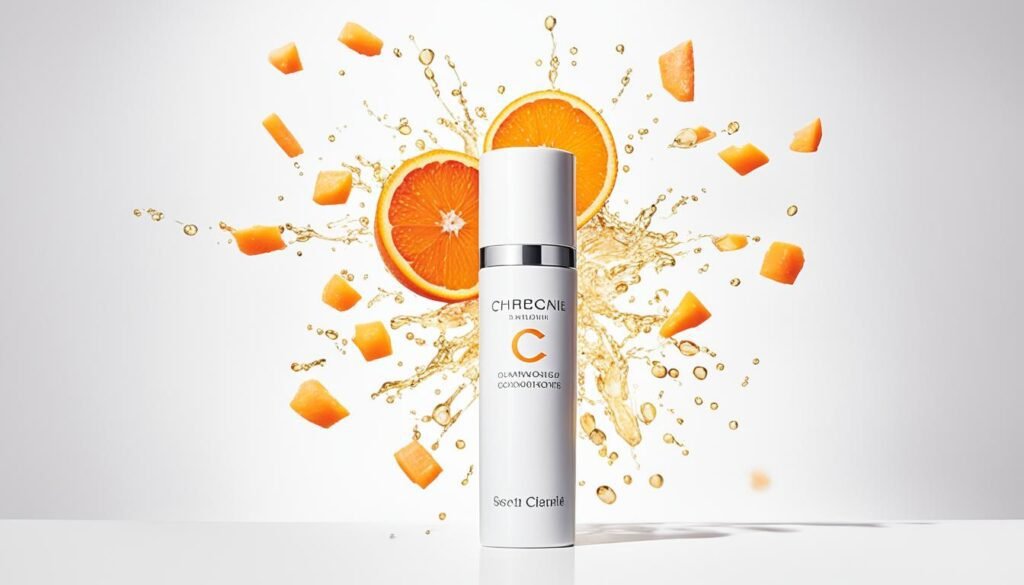
Vitamin C is a potent antioxidant that plays a crucial role in skin rejuvenation. It stimulates collagen production, promoting elasticity and reducing the appearance of wrinkles and fine lines. Vitamin C also helps protect against sun damage and hyperpigmentation caused by UV exposure.
Incorporating sources of vitamin C, such as citrus-based foods and supplements, can support the overall health and vitality of your skin. Topical creams containing vitamin C can also be used to reduce hyperpigmentation and enhance the effects of sunscreen.
When it comes to vitamin C, it’s important to choose products with stable and effective forms, such as L-ascorbic acid. This form of vitamin C penetrates the skin more efficiently and delivers optimal results.
Did You Know?
Vitamin C has been shown to provide additional benefits for the skin, such as reducing inflammation, promoting wound healing, and improving skin texture and tone.
Benefits of Vitamin C in Skin Rejuvenation
- Stimulates collagen production, enhancing skin elasticity
- Reduces the appearance of wrinkles and fine lines
- Protects against sun damage and hyperpigmentation
- Reduces inflammation and accelerates wound healing
- Improves skin texture and tone
How to Incorporate Vitamin C into Your Skincare Routine
To reap the benefits of vitamin C, you can include it in your skincare routine in several ways:
- Use a vitamin C serum: Apply a few drops of a vitamin C serum to clean, dry skin. Gently massage it into your skin and follow up with moisturizer and sunscreen.
- Choose vitamin C-infused moisturizers or creams: Look for moisturizers or creams that contain vitamin C for daily hydration and added antioxidant protection.
- Opt for vitamin C-rich face masks: Treat yourself to a vitamin C-rich face mask once or twice a week to give your skin an extra boost of radiance.
Remember, consistency is key when it comes to incorporating vitamin C into your skincare routine. Regular use can help you achieve optimal results and maintain healthy, rejuvenated skin.
Top Food Sources of Vitamin C
| Food Source | Vitamin C Content (per 100g) |
|---|---|
| Guava | 228.3mg |
| Kiwi | 92.7mg |
| Papaya | 60.9mg |
| Strawberries | 58.8mg |
| Pineapple | 47.8mg |
Include these vitamin C-rich foods in your diet to support your skin’s health from within.
Understanding the Benefits of Vitamin A for Skin Care
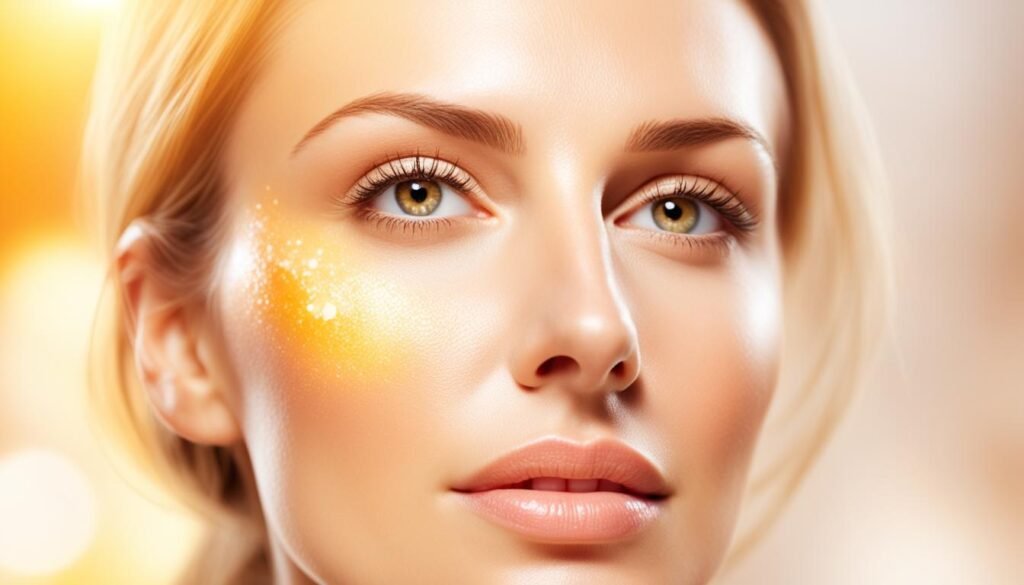
Vitamin A, also known as retinol, is a powerful antioxidant that offers numerous benefits for skin care. It plays a vital role in protecting against sun damage, promoting collagen production, and enhancing skin cell turnover. These effects contribute to a smoother and more even skin tone.
One of the notable uses of vitamin A is in acne treatment. Its ability to regulate skin cell production helps prevent clogged pores, reducing the occurrence of acne. Additionally, vitamin A can help reduce the appearance of acne scars, promoting a clearer complexion.
When using vitamin A products, it is important to exercise caution. Some people may experience initial redness and dryness when introducing these products to their skincare routine. To minimize these side effects, it is recommended to start with lower concentrations of vitamin A and gradually increase usage over time. Prescription products like tretinoin, which contain higher concentrations of vitamin A, are particularly effective in treating wrinkles and other signs of aging.
Overall, incorporating vitamin A into your skincare routine can lead to significant improvements in skin health and appearance.
Key Benefits of Vitamin A for Skin Care:
- Protection against sun damage
- Promotion of collagen production
- Enhancement of skin cell turnover
- Reduction of acne and acne scars
- Improvement of skin tone and texture
“Vitamin A is an essential component in maintaining healthy skin. Its antioxidant properties and role in skin cell production make it a valuable addition to any skincare routine.” – Dr. Amanda Johnson, Dermatologist
Conclusion
Achieving youthful and glowing skin is within reach when you incorporate essential vitamins into your skincare routine or diet. Vitamins such as E, C, A, D, B, and K are powerful tools in maintaining skin health, promoting collagen production, improving elasticity, and rejuvenating your skin. By understanding the benefits of each of these vitamins and incorporating them into your daily routine, you can unlock the secrets to achieving radiant and youthful-looking skin.
Whether through dietary sources or topical creams, these vitamins provide a natural and effective way to support the overall health and radiance of your skin. Consuming vitamin-rich foods and adopting a well-rounded skincare routine can help nourish your skin from the inside out, ensuring it stays vibrant and healthy.
However, it’s essential to remember that skincare is not a one-size-fits-all approach. Consulting with a healthcare professional or dermatologist can provide personalized advice tailored to your specific needs. They can guide you on optimal skincare practices and recommend the right vitamin supplementation, if necessary, for your individual skin concerns.
So, take charge of your skin health and radiance by incorporating essential vitamins into your daily routine. By doing so, you can enhance the natural beauty of your skin and achieve the youthful glow you desire.
FAQ
What are the essential vitamins for youthful skin?
The essential vitamins for youthful skin include vitamin E, C, A, D, B, and K.
How do oral vitamins impact skin health?
Oral vitamins have some benefits for skin health, although topical creams and ointments tend to be more effective. When taken orally, vitamins are distributed throughout the body, not just to the skin.
How can vitamins for glowing skin help reduce fine lines, wrinkles, pores, and dry skin?
Vitamins for glowing skin, such as vitamin C and E, can potentially help reduce the appearance of fine lines, wrinkles, pores, and dry skin. However, their impact may be minimal when taken orally.
What are the benefits of vitamin D for skin health?
Vitamin D plays a crucial role in maintaining even skin tone and can be beneficial in the treatment of conditions like psoriasis.
How can vitamin B improve skin care?
Vitamin B, specifically B3 and B5, helps smooth the skin, decrease dryness, and can treat conditions like eczema. Including foods rich in vitamin B or using topical products containing these vitamins can improve the overall condition and appearance of your skin.
What are the benefits of vitamin E for skin health?
Vitamin E is a potent antioxidant that protects the skin from sun damage, helps hydrate the skin, and aids in the repair of burns, wounds, and scars.
How does vitamin C contribute to skin rejuvenation?
Vitamin C stimulates collagen production, promotes elasticity, reduces wrinkles and fine lines, and protects against sun damage and hyperpigmentation caused by UV exposure.
What are the benefits of vitamin A for skin care?
Vitamin A, also known as retinol, protects against sun damage, promotes collagen production, enhances skin cell turnover, and is commonly used to treat acne and reduce the appearance of scars.
How can essential vitamins improve skin health?
Essential vitamins, when incorporated into your skincare routine or diet, can promote collagen production, improve skin elasticity, rejuvenate the skin, and support overall skin health and radiance.


